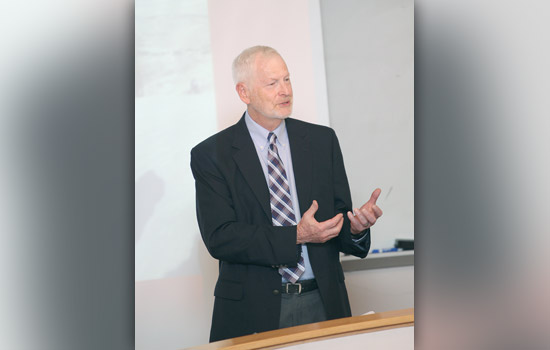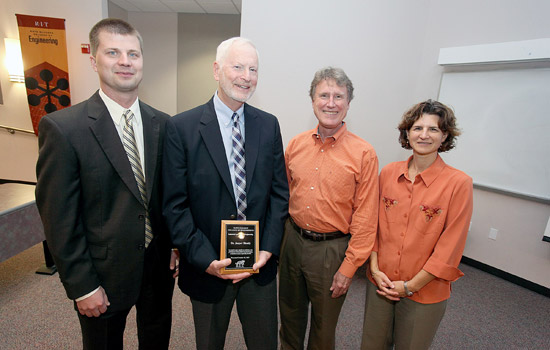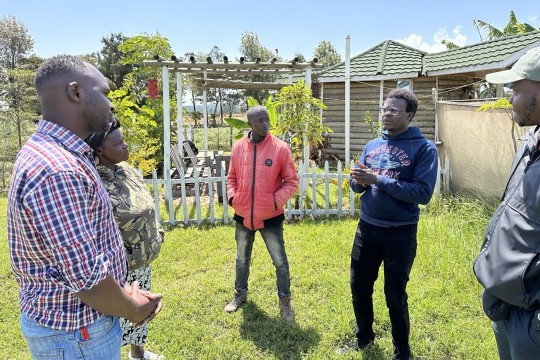Researcher on Ski and Snowboard Injuries Inducted into the Industrial and Systems Engineering Academy
Jake Shealy recognized for groundbreaking research and influence in the classroom
Kevin Fuller
Professor emeritus Jake Shealy, second from left, was recently inducted in the Industrial and Systems Engineering Academy. He is shown here with Scott Grasman, left, Industrial and Systems Engineering department head; Harvey Palmer, dean of the Kate Gleason College of Engineering; and Jacqueline Mozrall, right, associate dean of the engineering college.
He had never given a formal classroom lecture before he began teaching at RIT. His research findings about skiing and snowboarding injuries have become some of the most sought-after in the country.
Jasper “Jake” Shealy was recently recognized not only for this research, but also for his influence in the classroom when he was inducted into the Industrial and Systems Engineering Academy at Rochester Institute of Technology. The academy recognizes individuals who have made an impact on the field of industrial engineering and contributed to the success of the department and its students.
At the Oct. 14 ceremony in the Kate Gleason College of Engineering, several of his former students attributed some of their success to his influence as a scholar, mentor, colleague and friend.
“He was passionate about research, he was passionate about skiing, he was passionate about statistics,” says Jacqueline Mozrall, associate dean of the engineering college and a former student of Shealy’s.
“He was passionate about the research he did and it came out every day. He brought his scholarship and research and his projects into the classroom,” she adds. “To have that kind of example, if we all could be that lucky.”
Shealy came to RIT in 1973 after serving as an officer in the Air Force. He attended SUNY Buffalo, where he was a graduate research assistant in industrial engineering focusing on physiological aspects of human performance, risk perception and theories of accident causation, areas that he would later become known for in both academia and athletics.
“The night before my first lecture, I remembered just breaking out in a cold sweat,” he said. “I had this notion, I guess, that a professor just walked in, opened his mouth and pearls of wisdom came out, and folks went out the door afterward and that was it. I realized that is not the way it happens, and it took a lot of preparation for each lecture those first few years. So it’s really safe to say for the first couple of years, at least, I clearly learned more than the students did in the classes that I taught.”
He taught from the early 1970s to 2000 and received the Eisenhart Outstanding Teaching Award in 1977, one of RIT’s most prestigious awards to recognize faculty excellence. He became the department head, serving from 1992 until his retirement in 2000.
“Jake did not become department head of industrial and systems engineering because he liked administration or paperwork. Quite frankly, I don’t think he liked paperwork,” Mozrall added. “He did it for selfless reasons, to give back to the department. He did it to help the students and to continue to support the faculty, to help the department grow and prosper as it has.”
The department grew in size and influence as Shealy’s work in the use of helmets and the incidence of skiing or snowboarding accidents became prominent. In 2006, he worked with co-researchers and co-authors Robert Johnson, McClure Professor of Musculoskeletal Research, and Carl Ettlinger, adjunct assistant professor of orthopedics and rehabilitation, both of the University of Vermont, on “Do Helmets Reduce Fatalities or Merely Alter the Patterns of Death?” The findings describe how helmets may be effective at preventing minor injuries, yet they have not been shown to reduce the overall incidence of fatalities in skiing and snowboarding. The extensive study details helmet use by demographic, an analysis of use and non-use of helmets per related incidents and fatalities. He continues updating the information and is called upon by media as an expert regularly.
In July 2000, he stepped down as department head and Mozrall was named to the position. “Ironically, for a very short period of time before Jake retired, I became his boss,” she said laughing. Like her, several of the others in the audience had Shealy as undergraduates. Later they would become colleagues.
“He had set the tone for the department—open, civil, congenial,” said Brian Thorn, associate professor of industrial and systems engineering. “He shared his teaching talent, he shared his scholarship, he shared his house with his students. He made the industrial engineering department a good place to be, as a student and as a faculty member.”
Shealy and his wife, Lucy, residents of Fairport, N.Y., raised two daughters, Sarah and Katherine. He remains active as professor emeritus in the college, but also as a principal at Guidance Engineering, an engineering and scientific consulting company, where he specializes in human performance, ergonomics and biomechanics related to snow sports injuries. Shealy is a member of the board of the International Society for Skiing Safety and is one of three technical delegates representing the United States at the International Standards Organization on the topic of snow skiing equipment.
“He lived by example,” Mozrall added. “You know the company Life is Good? Its motto is, ‘Do what you like and like what you do,’ and that really is Jake. And he didn’t even need to say that, he lived it.”
 Jake Shealy Kevin Fuller
Jake Shealy Kevin Fuller













